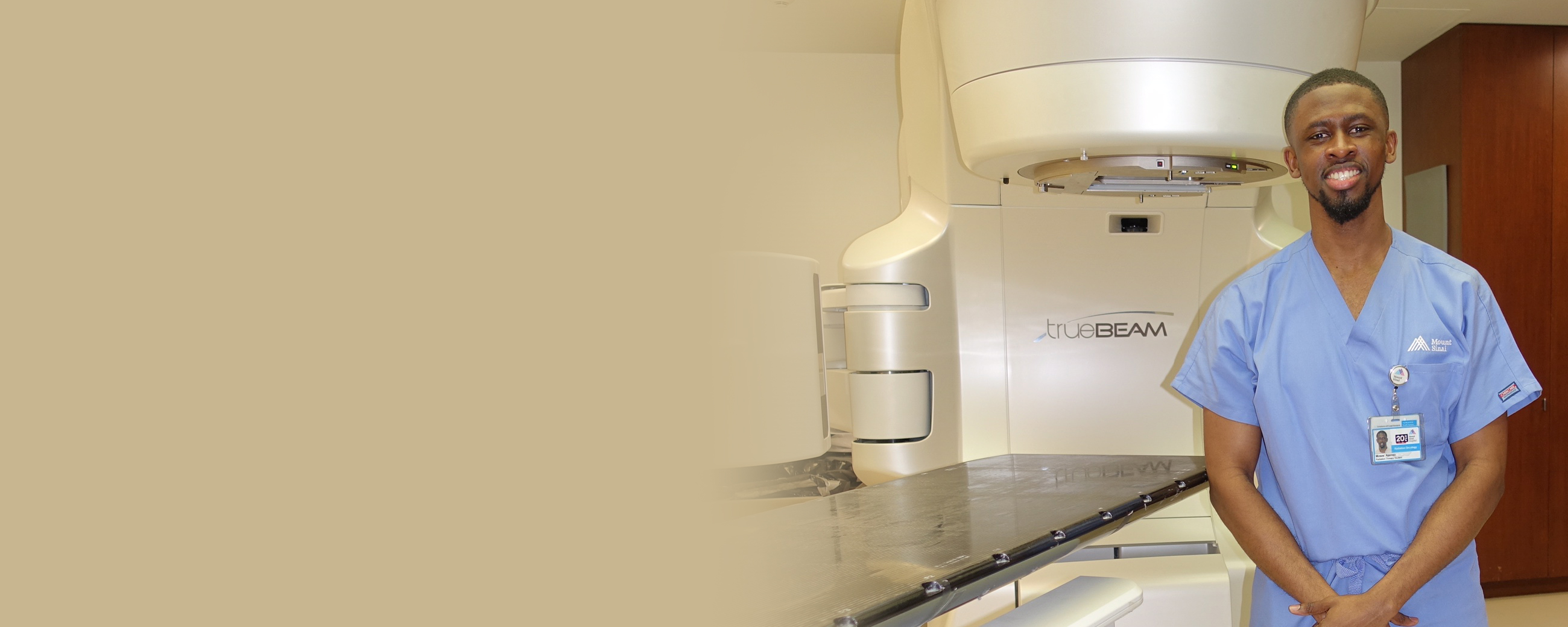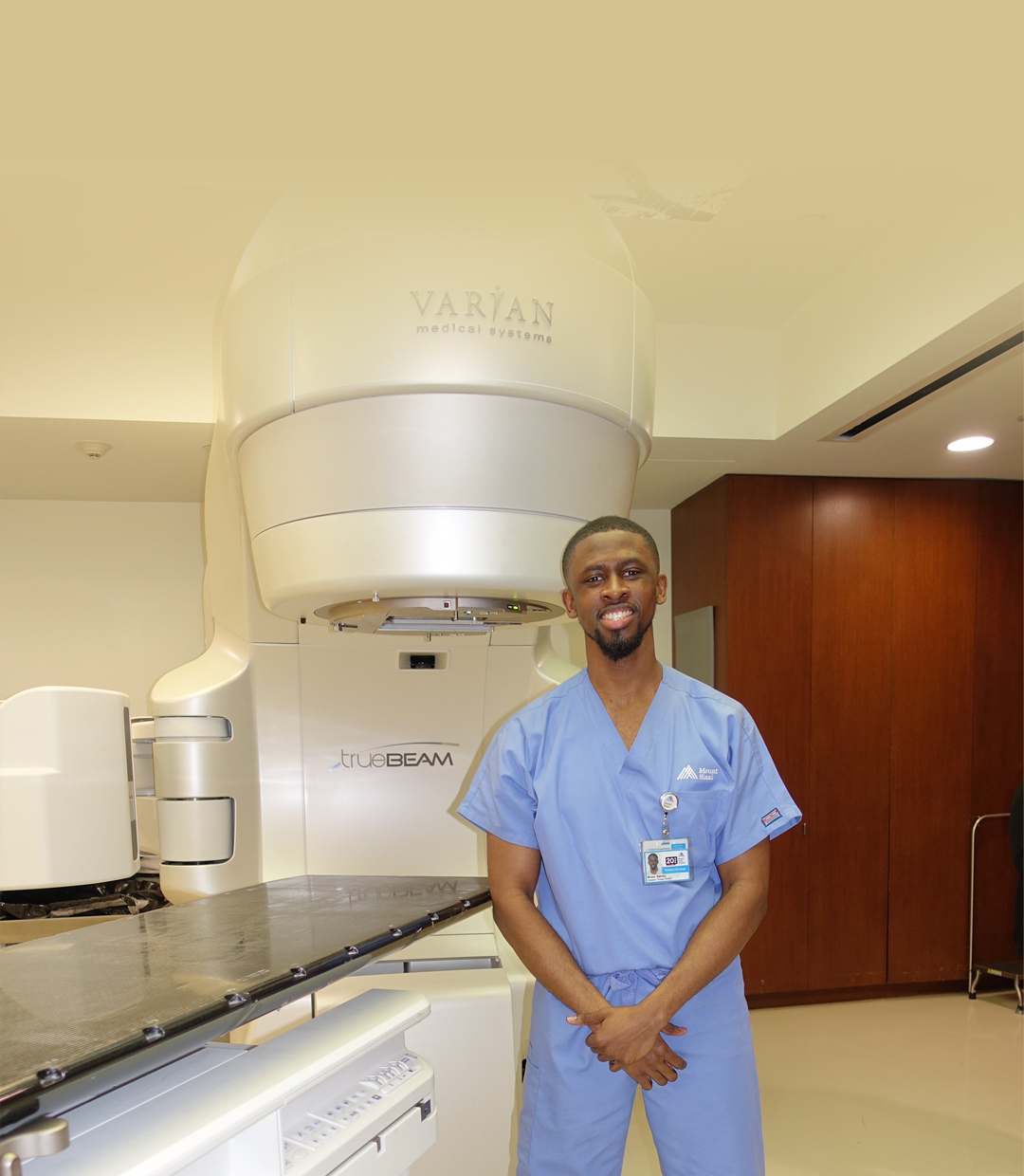Radiation Therapy | |||
| Admission Requirements | Curriculum | Technical Standards | Program Effectiveness Data |
| Student Handbooks | Brochure | ||
The Mount Sinai Center for Radiation Sciences Education at Stony Brook University is a partnership between Mount Sinai Health System's Department of Radiation Oncology and the School of Health Professions.
The Radiation Therapy (RTT) clinical concentration was developed to educate and prepare students to meet the daily challenges of a Radiation Therapist in the dynamic field of Radiation Oncology and meet the growing demand for radiation therapists nationwide. Radiation Therapists are key members of the radiation oncology team. They provide direct patient care to patients undergoing radiation treatment for cancerous and some non-cancerous conditions. After completion of the courses in this clinical concentration, students continue on to the RTT clinical non-credit, non-degree certificate program. The 12-months of clinical rotations in the RTT clinical non-credit, non-degree certificate program are conducted at the Mount Sinai Health System. Through this industry academic partnership, students will hone the skills that are required to serve our patients in the community while maintaining ethical standards and professionalism in and out of the clinic.
They will become an integral part of the health care team in the battle against cancer and leaders in providing the highest level of patient care. Successful completion of both the concentration and the clinical non-credit, non-degree certificate program are required in order to be eligible to take the national registry examination.
Since this is a program within the Health Science major, we only accept applications from students that have been advanced to the major's senior year curriculum.
- The radiation therapy didactic senior year curriculum (year 1 of the program) is delivered in person on-site at Stony Brook University with the exception of 8 credit hour courses, which are a combination of synchronous online and in-person class time. These courses are taught by the Mount Sinai Radiation Oncology faculty, who also have faculty appointments in the School of Health Professions.
- The radiation therapy 12-month non-credit clinical certificate program (year 2 of the program) requires students to be in person, on-site for all rotations, with the exception of 20 hours of didactic lecture, which is delivered synchronously online from experts across the health system.
- Total length of study is 5 years: Health Science major (4 years) + 12 months (clinical non-credit, non-degree certificate program).Bachelor of Science (BS) in Health Science is awarded upon successful completion of the certificate program.
Mission Statement: The mission of the Mount Sinai Center for Radiation Therapy at Stony Brook University (also known as the Radiation Therapy Program) is to optimize the knowledge, attitudes and skills of our students by preparing them to meet the daily challenges of a Radiation Therapist in the dynamic field of Radiation Oncology. Through clinical work and didactic courses students will hone their skills that are required to serve our patients in the community while maintaining ethical standards and professionalism in and out of the clinic. They will become an integral part of the health care team in the battle against cancer and leaders in providing the highest level of patient care.
Goal 1: Students will demonstrate clinical competence of an entry-level radiation therapist
Student Learning Outcomes:
- Students will deliver radiation therapy treatments as prescribed by a radiation oncologist
- Students will demonstrate basic knowledge and understanding relative to each site-specific setup
Goal 2: Students will possess critical thinking skills
Student Learning Outcomes:
- Students will adequately respond to challenges faced during treatment setup and delivery
- Students will show the ability to perform multiple tasks in a timely manner
Goal 3: Students will practice with professional values
Student Learning Outcomes:
- Students will display professional conduct
- Students demonstrate life-long learning
Goal 4: Students will display effective communication skills
Student Learning Outcomes:
- Students will demonstrate written communication skills
- Students will demonstrate oral communication skills
Accreditation
The Radiation Therapy Program is accredited by the Joint Review Committee on Education in Radiologic Technology, 20 North Wacker Drive, Suite 2850, Chicago, IL 60606-3182; 312-704-5300 Email: mail@jrcert.org
The program's current accreditation award is 8 years. General program accreditation information and the current accreditation award letter can be found on JRCERT's website. The most recent award letter can be found on the School of Health Profession's Website.
Cost
Tuition for the first year of the program can be found on Stony Brook's Tuition & Cost website.
Tuition for the second year of the program, the non-credit clinical certificate, can be found on Stony Brook's Student Financial Service's Website
Other Non-credit Certificate Program and Professional Estimated Required Expenses*
| Item | Cost |
|---|---|
| Textbook | $100.00 |
| Laptop | $750.00 |
| Castle Branch screening and compliance platform - general access | $87.00 |
| BCLS/CPR Certification | $100.00 |
| Professional liability insurance | $41.00 |
| National Professional Society Student Membership (ASRT) | $35.00 |
| State professional society membership (NYSSRS) | $30.00 |
| Registration fee for national exam | $225.00 |
| Registry Review | $150.00 |
| NYSSRS/RTANYS Conference | $500.00 |
| Licensure application fee | $120.00 |
Note: * There will be transportation expenses (vehicle, parking fees, fuel, etc.)
Health Insurance (required): Students can purchase the university plan or show proof of private insurance



